
“Someone wanted to restore USSR… He has got what he wanted”, EU Ambassador on Russian sanctions and assistance to Ukraine
Interview with the Ambassador of the European Union to Ukraine, Matti Maasikas, on EUR 19 billion assistance to Ukraine from the EU, path to EU membership and new sanctions against Russia.
In Russia’s war against Ukraine, journalists are fighting around the clock on the information war front. Truthful information is our weapon. The enemy took away our main source of funding — advertising.
In an interview with LIGA.net, the EU Ambassador and Head of the EU Delegation to Ukraine, Matti Maasikas, spoke about the amount of financial assistance to Ukraine, its path to EU membership, and EU sanctions that are crippling the Russian economy.
— You moved the interview from last Friday to Monday. Have you been away?
— Last Friday, a group of diplomats and I visited the recently liberated Izyum. It’s hard to find the words. Most of the town is destroyed. You can see live what one projectile can do and how it cut a five-story building into three parts. There is no electricity, no water.
And, of course, the burial sites. We were there on the last day of the exhumation at the mass burial place with 437 people in it. It is impossible to imagine that a human being is capable of such atrocities, but here we see them.
We had just left Izyum when reports came of two more mass graves discovered over there. I cannot wrap my head around that. Therefore, it is necessary to collect all the evidence of such atrocities, so that then justice will be served.
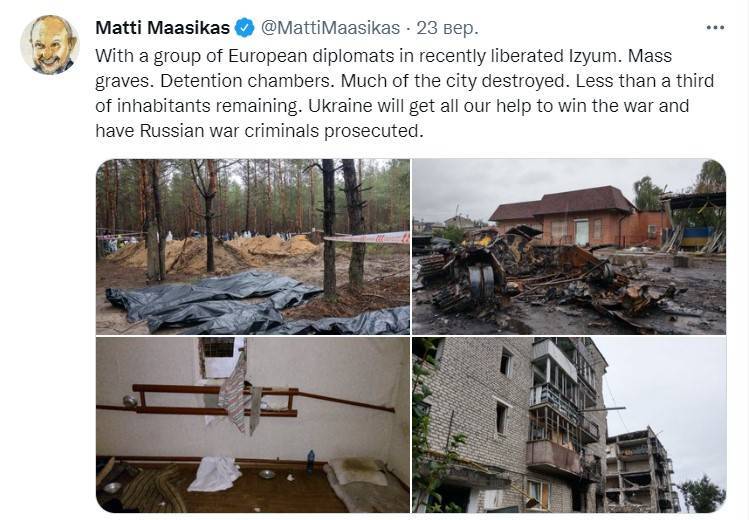
— We believe in the Armed Forces and hope for assistance from Ukraine’s Western partners. How does the EU plan to help?
— Even before the invasion, the EU allocated EUR 1.2 billion of emergency financial assistance. In May, we promised another 9 billion euros for this year, of which Ukraine has already received EUR 1 billion. 5 billion is already on its way to Ukraine, and the remaining EUR 3 billion is still under discussion.
The EU covers a significant part of Ukraine’s needs. If I understood the representatives of the Ukrainian authorities correctly, the amount of 9 billion euros is enough to cover this year’s budget deficit.
— Are you in contact with our Ministry of Finance?
— In daily contact. Not me personally, but EU services and colleagues from Brussels.
— Does the entire European Union speak with one voice that ‘we must help Ukraine’?
— Facing really big problems, the EU member states have always been able to find unity. A nuclear-armed country attacking a neighbour for no reason is precisely the big problem, and the EU presently remains unanimous on this issue.
Foreign policy decisions of the EU are adopted unanimously. It was, for example, on the allocation of weaponry for a total of EUR 2.6 billion, and on Ukraine’s candidate status for EU membership. These decisions were adopted unanimously, all EU member states agreed with them.
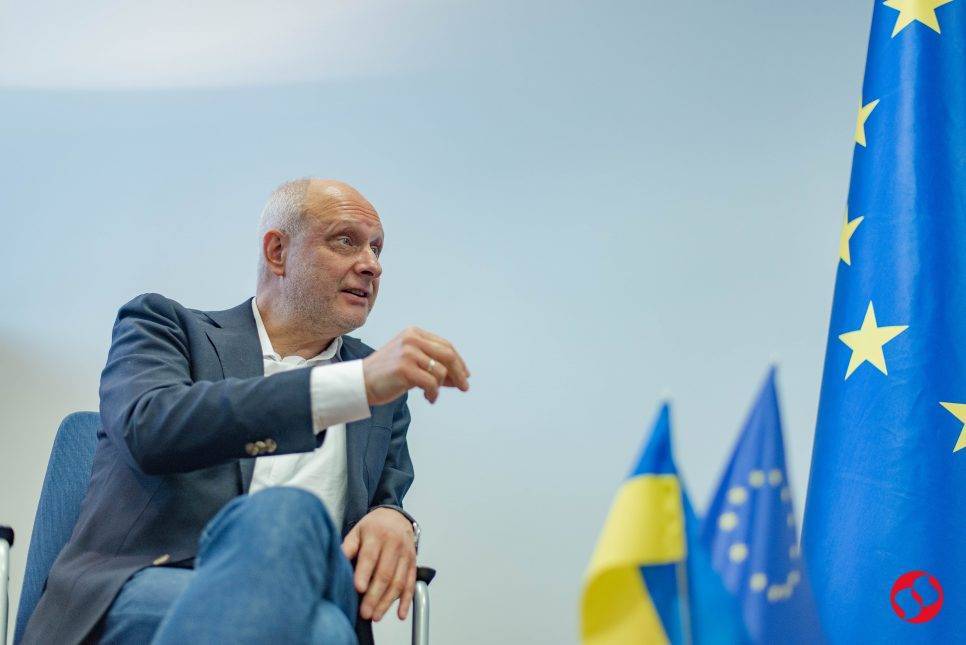
— They do not plan to suspend assistance to Ukraine in the EU, do they?
— You must have seen how less than two weeks ago the President of the European Commission, Ursula von der Leyen, made a landmark statement in the European Parliament. Mrs. Zelenska was also present there.
After her statement, President Von der Leyen left for Ukraine to send a clear message – the EU stands with Ukraine as long as it is necessary. Our goal is to help Ukraine win this war.
— Are there any red lines that Ukraine should not cross in order to maintain the EU support?
— Ukraine is fighting and receiving heavy supplies from Western partners. However, this entire burden, first of all, falls on the shoulders of Ukrainian servicemen and volunteers. Therefore, Ukraine must independently determine under what circumstances this war can end.
This is supported in the EU. We recognize your right to decide what victory is, when it is there, whether there will be negotiations — it’s all in the hands of Ukrainians.
— You mentioned the amount of 9 billion euros. Is this the maximum assistance limit from the EU?
— Of course not, when considering assistance provided by the EU as an organization and individually by EU member states. Some countries and organizations provide bilateral assistance.
For example, Germany independently allocated EUR 1 billion in macro-financial assistance. Let’s add to this another EUR 2.6 billion from the European Peace Facility for the procurement of weapons.
In total, the assistance from the European Commission and EU member states since the outbreak of the full-scale Russian invasion amounts to EUR 19 billion — this includes all mobilized grants, loans and guarantees. This is an absolutely unprecedented figure, and so is the situation. And in fact, I see a strong determination to continue.
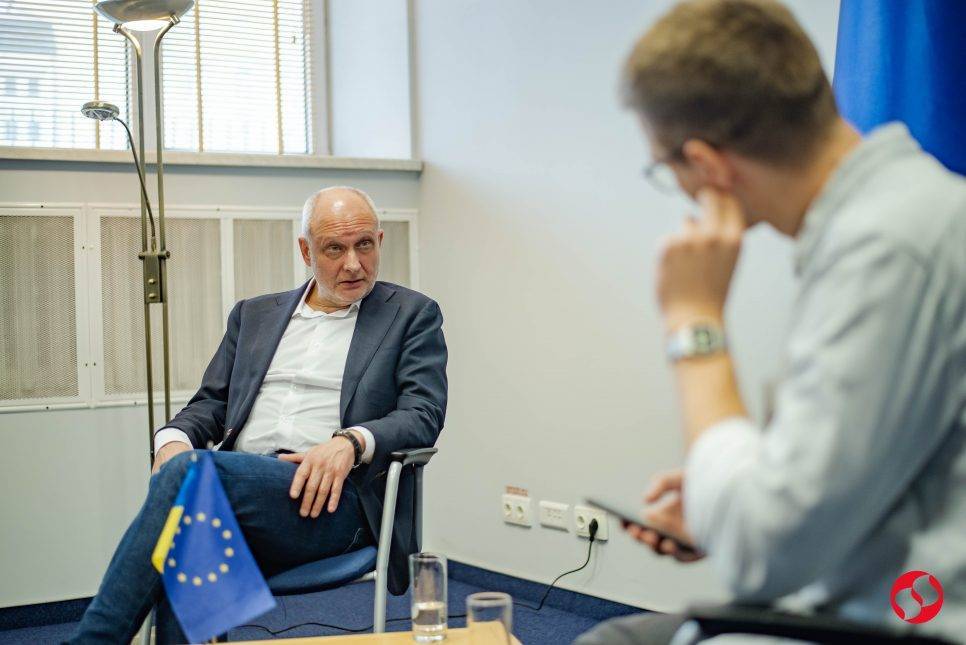
— You said that the current assistance comes from various sources channelled to the variety of beneficiaries, according to different procedures. Can you explain the principle of allocation of funds to Ukraine?
— The largest share comes as micro-financial assistance directly to the state budget for the Government. Then there are not loans, but grants from various organizations. The European Peace Facility that I have just mentioned is a separate source of funding. Then there is humanitarian aid, which is a separate line of assistance.
This is to demonstrate that different sources and facilities are involved in the assistance delivered from the EU. By the way, one of the very tangible support areas, which can only be measured financially in due course, is what is happening in the field of trade.
The EU made great efforts to help Ukraine with grain exports. In June, all duties and quotas for Ukrainian exports were abolished unprecedentedly. The financial impact of this assistance will only be seen later. Ukraine supplies Europe with a lot of agricultural goods, and they have always been politically sensitive.
— What about reforms in Ukraine? Will further assistance depend on the reform implementation?
— Macro-financial assistance is always based on certain conditions. Given the current conditions, they are currently very easy. They are mostly related to preparation for reconstruction. So that the government could build plans.
— There have been talks about an ‘industrial visa-free regime’ going on for several years now. What is known about its implementation timing?
— It mostly depends on the Ukrainian side. We look closely at what Ukraine has already done and what it still has to do. And I want to explain this in more detail since it is important.
Why can’t one just take and approve the Agreement on Conformity Assessment and Acceptance of Industrial Products (ACAA), or ‘industrial visa-free’? All goods entering the Single European Market must meet quality and environmental standards. They are the highest in the world because the customers are EU citizens, who are relatively wealthy and very demanding.
This process takes time. We are adamant that certification in Ukraine 100% complies with ours. It is very easy to simply pass a law, but it must also be enforced. We must be completely sure of the quality.
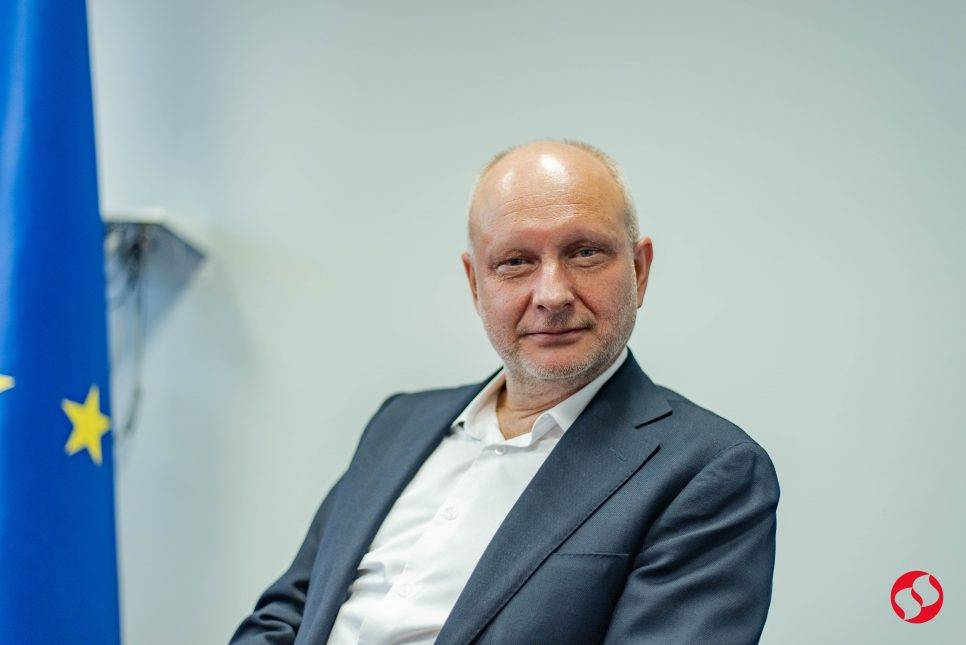
— Since October, Ukraine has joined the ‘customs visa-free’ with the EU. Is it clear who will benefit from this simplification and how?
— From October 1, the ‘customs visa-free’ (NCTS – New Computerised Transit System) with the EU will become operational. It will allow to submit electronic transit declarations. This will save an awful lot of time.
‘Visa-free roaming’ is also currently in the pipeline — Ukraine joining the European free roaming area. Soon Ukrainians will be able to enjoy the same connectivity services that are provided in the EU.
In her statement, President von der Leyen outlined the most significant part of the work — Ukraine’s integration into the Single European Market before its accession to the Union. This is possible given the association. First, it is necessary to bring the standards to the ideal, then enter the Single Market. This also applies to digitalization and the financial sector — there are many potential ‘visa-free’ opportunities out there.
– How will Ukraine and the EU benefit from this?
— Ukraine will have full access to one of the largest and wealthiest markets in the world. As for the EU, our companies will be able to unleash their potential in Ukraine. It is mutually beneficial.
— In your opinion, does Ukraine have a chance to become an economic tiger of Europe?
— Ukraine’s potential is significant. Of course, not only in agriculture, but in industry, energy and all other domains.
Ukraine has its natural resources. Wind and solar are becoming more and more important, and you have them too. You have a significant industrial capacity and traditions, well-educated population, and an ‘explosive’ IT sector. Therefore, Ukraine has every chance to become such a tiger.
Perhaps it is difficult to discuss such an issue during the war. But we must be forward-looking. It is unpleasant to say, but wars have often worked as development accelerators in the history of mankind. Not only in the sense of inventing new weapons, but also in others.
— How to increase these chances?
— Ukraine approved the future recovery principles with international donors in Lugano and at other conferences. One of the important principles announced there is sustainability.
More and more Ukrainian industrial infrastructure is being destroyed by the Russians. But when it is rebuilt, it must be based on state-of-the-art technologies, on the ‘greenest’ technologies. Ukraine will leapfrog into a new climate-friendly world in a broad sense.
Another Lugano principle is transparency and eradication of corruption. This has been holding back Ukraine’s potential for decades, and it must be stopped. In the field of fighting corruption and in the judicial reform, we have recently seen many achievements. This is important for investors.
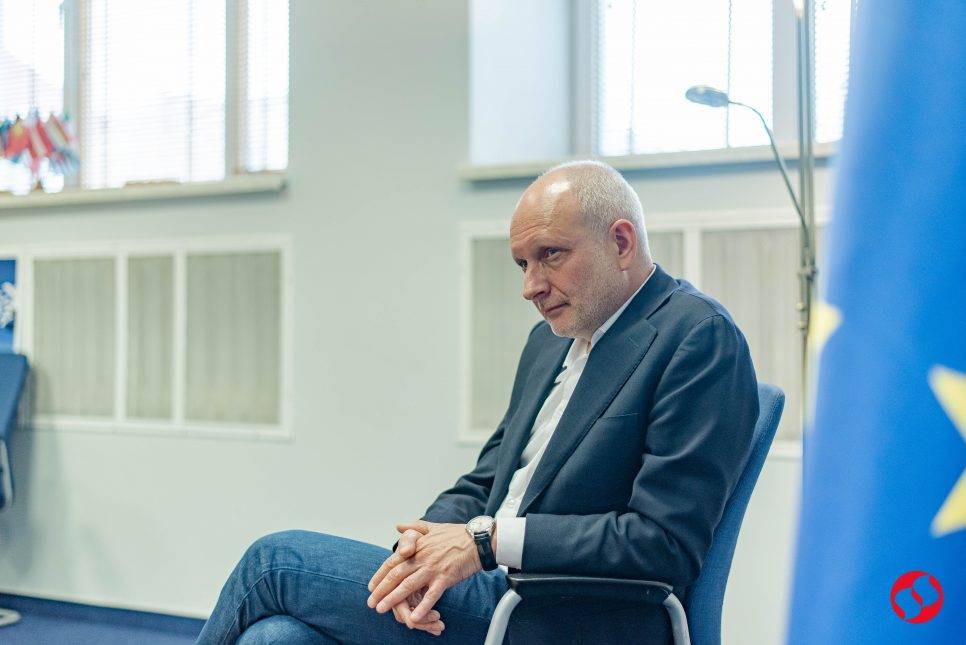
— How can post-war Ukraine attract investors?
— By eradicating corruption, judicial reform, highest-possible openness to investors. It is being worked on every day.
— We were granted the candidate status. How do you assess our journey towards the EU?
— You broke all European records for that time. It usually took eight months for promising candidates to complete the application form. You did it within a week. When I talked to Ukrainian ministers and other officials, there was an understanding that this moment is now, and it must be seized.
— When will Ukraine become an EU member state? How long did it take for other candidate countries?
— Like I already said, you broke all the records, but no one can say that for sure.
This is mostly in your hands. It will depend on Ukraine implements reforms, adopts and adapts European laws. There is no average universal time. For example, for my native Estonia, this process lasted 9 years.
— Ukraine’s Foreign Minister Dmytro Kuleba said the eighth package of EU sanctions is expected in September. Is the timing still relevant?
— The discussion continues between the EU members states. All EU foreign policy decisions must be supported and adopted unanimously.
Talks between the EU member states are currently going on quite intensively. Of course, the recent escalating moves by President Putin and the leadership of the Russian Federation have also accelerated our work.
We will see the results of our work soon. I cannot predict them at this time.
— Did the EU assess the damages that Russia has suffered due to the imposed sanctions?
— Yes, we see that Russia’s economy (GDP) will fall by at least 10% this year. Russian inflation is about 22%. They are extremely dependent on Western technology. Russian banks are cut off from the world. Two-thirds of Russian civil aircraft are made in the West, they can no longer repair them. More than 1,000 foreign companies have left Russia.
This reminds me of the Soviet Union’s languish in my childhood – no foreign goods, no international news, crossing the border only by land (and even that is becoming impossible now). If such a ‘someone’ wanted to restore the USSR, then, in a sense, this ‘someone’ has got what he wanted.
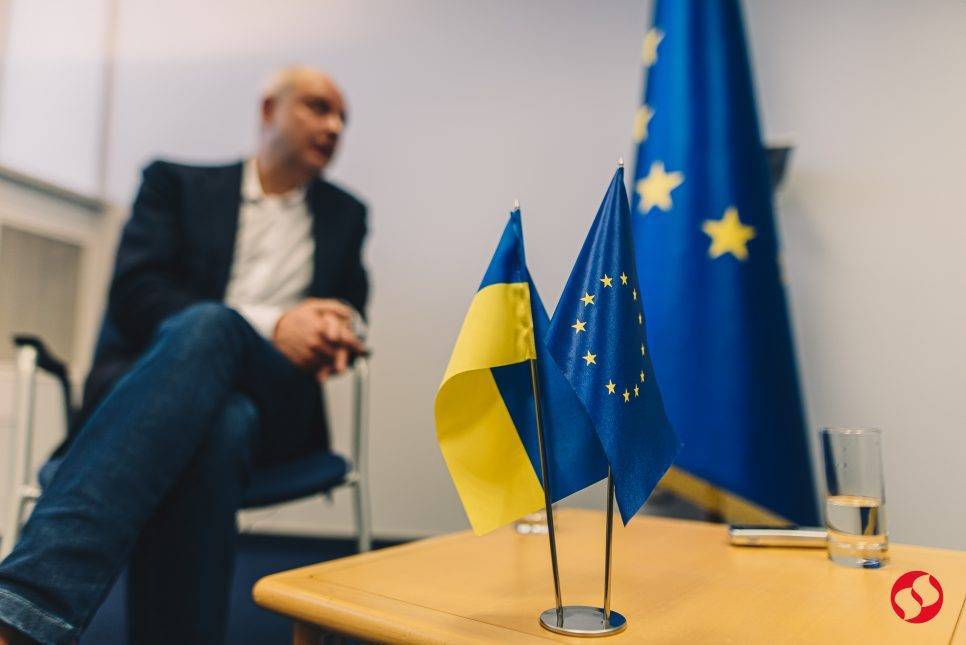
— In your estimate, are the sanctions tough enough or not?
— These are the toughest sanctions ever imposed on a superpower, a state with nuclear weapons, a member of the UN Security Council. They are very heavy and damage them very effectively.
Source: Liga.net
Media, Publications
-
Deputy Ambassador of the EU on enlargement, reforms and €190 billion in support
-
EU membership in 2030? Deputy Ambassador of the EU answers students’ questions
-
How does the EU take decisions on Ukraine? Subsidiarity, unanimity and consensus among 27 countries
-
What reforms does Ukraine still need to join the EU? Deputy Ambassador of the EU answers
-
How can Ukrainian students become more involved in EU programmes and projects? Deputy Head of the EU Delegation answers
-
Are there alternatives to European integration if the road to the EU is long? Deputy Ambassador of the EU answers